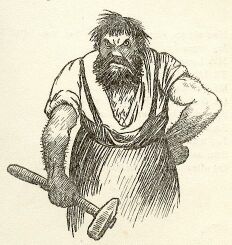See also
Surname list
This page lists people with the surname Kotlarczyk. If an internal link intending to refer to a specific person led you to this page, you may wish to change that link by adding the person's given name(s) to the link.
Kotlarczyk is a Polish-language surname a diminutive form of a nickname literally meaning the occupation of kotlar, tinker/tinsmith. Notable people with the surname include:
Kowalczyk is the fifth most common surname in Poland. The name comes from the word "blacksmith".
Kowalewski is a Polish surname. It may refer to:
Adamczyk is a Polish surname. Notable people with the surname include:
Adamkiewicz is a Polish surname. Its Russified form is Adamkevich, Lithuanized: Adamkevičius.
Bednarek is a Polish surname. Notable people with the surname include:
Pawlak is a Polish surname, it may refer to:
Kowal is a Polish surname meaning "smith". It may refer to:
Pawlik is a surname. It is a diminutive of the Polish given name Paweł ("Paul"). Pawlik is related to the Czech surname Pavlík.
Młynarczyk is a Polish surname meaning a "small miller". Notable people with the surname include:
Szewczyk is a Polish occupational surname, derived from the occupation of szewc ("shoemaker"). It is related to the Czech name Ševčík and Ukrainian surname Shevchik (Шевчик) and Shevchuk (Шевчук).
Kovalevich is a Slavic surname used in Russian and Ukrainian, Belarusian, and Polish cultures.
Kowalik is a Polish surname. The word has two literal meanings: a bird of nuthatch genus or a diminutive of Kowal, meaning "smith". Notable people with the surname include:
Cieślik is a Polish surname. Notable people with the surname include:
Białkowski is a Polish surname. Its Russified form is Belkovsky/Belkovski.

Kovalyuk or Kovaliuk, Kavaluk, Kowaluk (Polish) is a common East Slavic surname, similar to Kovalchuk in origin and usage.
Bielak is a surname. Notable people with the surname include:
Pawelek or Pawełek is a surname. Notable people with the surname include:
Białek is a Polish-language surname. Archaic feminine forms: Białkówna, Białkowa. Notable people with this surname include:
Jan Andrzej Kotlarczyk was a Polish footballer who played as a midfielder. His brother Józef was also a footballer.
Stolarczyk is a Polish surname, meaning a "little carpenter". Notable people include: